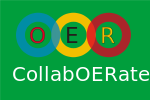About
Contents
Context and problem
Global demand for post-secondary education far outstrips the capacity of the existing formal education system to respond. Governments do not have adequate financial resources to increase the capacity of the formal education system by establishing new institutions. However, it is possible to scale-up educational delivery by:
- Widening access to high quality informal learning using a combination of Open Education Resources (OER) and the open web. This will necessitate the availability of high quality distance education courses designed for independent self-study and released as OER which can be reused, adapted and modified by institutions on a global scale.
- Implementing flexible pathways to achieve formal credit and qualifications. This will require institutions to implement alternatives for informal OER learners to assess and accredit their learning.
Concept
Individuals are free to learn from OER hosted on the open web. The OER for Assessment and Credit for Students Project is a new initiative designed to provide opportunities for these informal OER learners to gain formal academic credit for their learning using high quality OER designed for independent study and distance education delivery methods.
This OER initiative will align with the community service and outreach missions of the formal education sector. Through the community service mission, it is possible to open pathways for informal OER learners to earn formal academic credit and pay reduced fees for assessment and credit using open content resources designed for distance learning. As OER, all post-secondary institutions in the world will be able to participate. In this way the OER movement can contribute to addressing the global demand for higher education where traditional delivery models are unable to respond to the need for higher education education.
Pathways for assessment can include:
- Mapping of OER providers and the networks of OER supportive institutions and organizations
- Official record-keeping of credits earned by individual learners in secure and reputable databases
- Publication of clear and direct learning outcomes with pathways to achievement
- Assembly of learning pathways using OER
- E-portfolios of learners’ ‘best work’ compiled throughout a period of study
- Computerized testing and examinations
- Task-based project evaluation mechanisms
- Educational games with objective learning outcomes
- Merging of online IT skills with subject matter to promote real world outcomes
- Development of processes to make use of learners’ activities and learner-created content
- Scalable learning system development based on collaborative peer-to-peer crowd learning and on-demand support
This international collaborative project will provide:
- the evidence for educational leaders to evaluate the model for mainstream adoption of OER into the formal curriculum.
- the groundwork for a more comprehensive feasibility study to evaluate the establishment of the OER university - - a virtual international portal service listing OER credentials for informal learners around the world and a register of the formal education institutions who provide assessment and credit pathways.
Anchor partners
Athabasca University (Canada), the OER Foundation (International), Otago Polytechnic (New Zealand) and the University of Southern Queensland (Australia) have agreed to convene a strategic planning meeting on 23 February 2011 in Dunedin, New Zealand to commence planning for this project. This project subscribes to open philanthropy and all strategic and operational plans will be developed openly and transparently. Moreover, all organisations who agree to the principles of engagement for the project (see below), are free to participate.
Principles of engagement
Participants of the OER Assessment and Credit for Students project are serious about getting OER right and crossing the chasm from early adopters of open content to mainstream organisational implementation. All institutions are free to join the project moving from the notion of sharing to Learn to learning to SHARE. The following principles of engagement apply:
- Learning materials for all courses contributing to the qualification credentials will be based entirely on OERs, where to the greatest extent possible, meeting the requirements of the Free Cultural Works definition.
- Participating organisations must subscribe to the values and practices of open philanthropy with reference to all activities of this project.
- Participating teaching institutions will provide assessment services at reduced fees when compared to full course enrolment fees.
- Participating teaching institutions will offer credentials for informal OER learning which are aligned with approved programmes and/or national qualification frameworks.
Objectives for the foundation phase
The purpose of the first phase of the project is to establish the foundations for:
- The collaborative development of:
- A logic model including inputs, activities, outputs and impact framework for the OER for assessment and credit for students project.
- An implementation plan derived from the logic model.
- Implementing one or more credentials based on OER resources for piloting and refining the model across multiple institutions in the formal education sector.
- Developing sustainable models for volunteer student support now possible through international digital collaboration and community service learning approaches.
- Building a network of formal education institutions, OER agencies, governments and international agencies to contribute to the incremental development and refinement of a sustainable international OER ecosystem.
Seed funding
The OER for assessment and credit for students project will require seed funding from external funding agencies. The international collaborative is interested in pursuing funding opportunities to contribute to the development of a sustainable global OER ecosystem.
